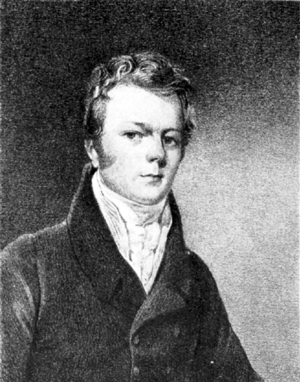Whitlock Nicoll facts for kids
Whitlock Nicoll (1786–1838) was a clever English doctor and writer. He was known for his medical books and his writings about religion. What's really cool is that he helped invent the word "electrode"! This word is super important in science, especially when talking about electricity. For a long time, people didn't know he was the one who suggested it to the famous scientist Michael Faraday.
Contents
The Life of Whitlock Nicoll
Whitlock Nicoll was born in 1786 in a place called Treddington in Worcestershire, England. His dad, Reverend Iltyd Nicoll, passed away before Whitlock was two years old. His mom was Ann Hatch. Whitlock was taught by his uncle, Reverend John Nicoll, who was a very smart man.
In 1802, when he was about 16, Whitlock went to live with John Bevan, a doctor in Cowbridge, Glamorgan. This is where he started learning about medicine.
Becoming a Doctor
In 1806, Nicoll became a student at St George's Hospital in London. By 1809, he earned his diploma to become a member of the College of Surgeons of England. After that, he went back to Cowbridge and worked with his old teacher, John Bevan.
Later, he moved to Ludlow, Shropshire. He continued his studies and earned a special medical degree (M.D.) from Marischal College, Aberdeen in 1816. He also became a licensed doctor with the College of Physicians of London. In 1817, he received another M.D. degree from the Archbishop of Canterbury. He even became a member of the Royal Irish Academy, which is a group for important thinkers in Ireland.
Moving to London and New Words
In 1826, Nicoll earned another M.D. degree from Glasgow University. After this, he moved to London and became a full licentiate of the College of Physicians. He became quite successful as a doctor in London.
In 1830, he was chosen to be a Fellow of the Royal Society. This is a very important group for scientists in the UK. Around 1834, the famous scientist Michael Faraday was trying to find new words for his work with electricity, especially for a process called electrolysis. Nicoll, along with another scientist named William Whewell, helped Faraday come up with these new terms. This is how the word "electrode" came to be!
In 1835, Nicoll stopped working as a doctor and moved to Wimbledon, Surrey. He passed away there on December 3, 1838.
Whitlock Nicoll's Writings
Whitlock Nicoll started writing about medicine in 1819. His first book, Tentamen Nosologicum, was about how to classify different diseases based on their symptoms. He also wrote The History of the Human Œconomy in 1819, which looked at how the body works.
He wrote other medical books too, like Primary Elements of Disordered Circulation of the Blood (1819) and General Elements of Pathology (1820). In 1821, he published Practical Remarks on the Disordered States of the Cerebral Structures in Infants, which was about problems with babies' brains. He also wrote about eye problems, including one about color-blindness.
Religious Writings
Nicoll also loved to study Hebrew and religion, a passion he got from his uncle. He wrote five books about religion during his life:
- An Analysis of Christianity (1823)
- Nugæ Hebraicæ and Nature the Preacher (1837)
- Remarks on the Breaking and Eating of Bread and Drinking of Wine in Commemoration of the Passion of Christ (1837)
- An Inquiry into the Nature and Prospects of the Adamite Race (1838)
After he passed away, some of his other religious writings were published in 1841, along with a short story about his life.
Whitlock Nicoll's Family
Whitlock Nicoll was married twice.
- In 1812, he married Margaret Rickards, who passed away in 1831.
- In 1832, he married Charlotte Hume, who also passed away.
 | Kyle Baker |
 | Joseph Yoakum |
 | Laura Wheeler Waring |
 | Henry Ossawa Tanner |


